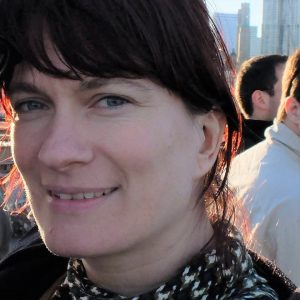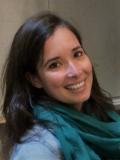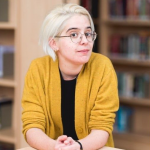
Incomplete lives: Islamophobia in Belgium as the governance of Muslim subjectivities and restriction of life aspirations

Lunch seminars are informal presentations where an internal or visiting researcher presents their work during lunch. You are welcome to bring your lunch along! We offer tea and coffee to go with it.
The seminars are hybrid and take place on campus and online. Please register by sending an email to haiyan.huang@ugent.be
The seminars are open to all, PhD students, postdocs, senior researchers, and other interested individuals.

Within the context of black families, candid talks about women’s sexuality continue to be restricted, with the exception of pithy exhortations that aim to scare young women from experimenting sexually. Many other aspects of sexuality are supressed through various discursive strategies. By drawing upon the narratives of the lived experiences of two generational cohorts of black women (between the ages of 20-30 and 40-62), this study identified some of the discourses that black mothers and their daughters use to shape their understanding of sexuality in contemporary South Africa. Findings show that silence and restrictions characterise the way knowledge about sexuality is communicated to women in different age groups. Importantly, insights from these black women show that female sexuality continues to be heavily influenced by traditional ideas about respect, marriage, safe sex and diseases. Collectively, the narratives revealed that mothers and their daughters simply do not have the words to encourage a positive expression of sexuality, that is, a language to talk affirmatively about sexuality. Young women especially end up holding evasive and ambivalent views about their sexuality, with a decreased sense of sexual self-awareness and agency.
Memory is a doctoral candidate in the Department of Sociology at Ghent University. She identifies herself as a feminist sociologist who is intrigued by different forms of social inequalities that are linked with gender and (hetero)sexuality specifically. She is most interested in studying how gender and sexuality intersect with other social phenomena such as race and class.
he seminar investigates the Italian ‘family planning’ movement – its ideologies, programmes and impacts – as a case study illustrating the global interconnectedness of discourses of sexual modernisation in the early Cold War era. While the Italian FP movement was highly impactful in campaigning for the legalisation of birth control (1971), its ideology, strongly influenced by transnational networks advocating population control in the Global South, was marked by a consistent social hierarchisation of reproductive bodies. The case study forms part of a AHRC Leadership Fellowship project on the emergence of notions of reproductive rights in Europe in the global context (1945-1995).
Maud is a Reader in Modern European History at the University of Glasgow, Scotland, and specialises in social, political and gender history of Europe after 1945. She holds a PhD from the EUI Florence and has published on European second-wave feminism, 1968, women and work, West European communism in the Cold War. She leads Glasgow’s Centre for Gender History.
Burcu is a doctoral scholar at the Centre for Cinema and Media Studies at Ghent University. Her research focuses on how social media such as Instagram and Snapchat are affecting the discourses, media practices and identity politics of young people. Powerful identity axes such as gender, ethnicity, sexuality and religiosity are discussed and studied in relation to sensitive topics as sexual morality, diversity and gendered visibility within digital youth cultures.
 In this brown bag seminar, Eline Huygens will present her current work in progress as part of her PhD project entitled ‘Gender, relationships, and sexuality. An empirical study on the lived experiences of young Catholic women’. In particular she will talk about the entanglement of relationships and religiosity in Catholic women’s lives.
In this brown bag seminar, Eline Huygens will present her current work in progress as part of her PhD project entitled ‘Gender, relationships, and sexuality. An empirical study on the lived experiences of young Catholic women’. In particular she will talk about the entanglement of relationships and religiosity in Catholic women’s lives. Instagrammable Femininities: exploring the gender politics of self-representations on Instagram and women’s magazines
Instagrammable Femininities: exploring the gender politics of self-representations on Instagram and women’s magazinesIn this brown bag seminar, Sofia P. Caldeira will present her research. She recently successfully defended her PhD thesis in Communication Sciences (Ghent University) with the title ‘Instagrammable Femininities: exploring the gender politics of self-representations on Instagram and women’s magazines’.
Sofia is a member of the Centre for Cinema and Media Studies (CIMS) at Ghent University, Belgium. Her research focuses primarily on social media, self-representation practices, politics of gender representation, and feminist media studies.
Facebook: https://fb.me/e/5pJq5NP9Q
Katrien De Graef, PhD (2004) in Oriental Languages and Cultures, is associate professor of Assyriology and History of the Ancient Near East at Ghent University. She has published extensively on 2ndmillennium BC socio-economic history of Mesopotamia (modern Iraq and Iran). Her current research focusses on the role of women in Old Babylonian economy, religion and society. She is a member of the Gender, Methodology, and the Ancient Near East (GeMANE) Study group, a scientific platform for the international community of Ancient Near Eastern scholars working on gender related themes.
Susannah Crockford is a post-doctoral researcher at Ghent University in Belgium. Her research interests focus on spirituality, millenarianism, and discourses of nature and climate change. She earned her PhD in anthropology in July 2017 from the London School of Economics, and previously completed an MA in religious studies at the University of Amsterdam and an undergraduate degree in anthropology at the University of Cambridge.
Anaïs Van Ertvelde holds an Ma in history (UGent) and an Ma in gender studies (UUtrecht). Her research interests lie where bodies and social movements intersect. She is currently a PhD student at Leiden University’s Institute of History where she looks into how during the 1970s and 1980s disability became a concern for governments and social movements alike and how the concept can be understood in a bipolar world. Her research is part of the broader project Rethinking Disability. The Global Impact of the International Year of Disabled People in Historical Perspective (http://rethinkingdisability.net/).
Koen de Munter (1960) studied Roman Philology (Ma) and Comparative Science of Cultures (Ma, PhD) at UGent. As an anthropologist he has been working since the nineties in the Andean region, mostly in the Bolivian Altiplano, with Aymara families who commute between the indigenous city of El Alto and their home communities. Academically he has been employed in different universities in Chile, since 2012 he holds an appointment at the Department of Anthropology at Universidad Alberto Hurtado (Santiago de Chile). From the study of intercultural and postcolonial dynamics in the Andean region he has evolved in recent years towards a much more ‘biosocial’ (socialecological) perspective, focusing the theoretical reflection on the relevance of Tim Ingold’s recent work about an anthropology of life an about an “education by attention”. Koen de Munter has been conducting longstanding research projects, amongst other things about “Vivir bien” praxis, politics and ideologies (2015-2019). He is currently the principal investigator of a project about “Aymara cosmpraxis in a relational world: “making family” with the living, the dead and the wak’as” (Chilean government funded Fondecyt Regular 1190279, 2019-2022).